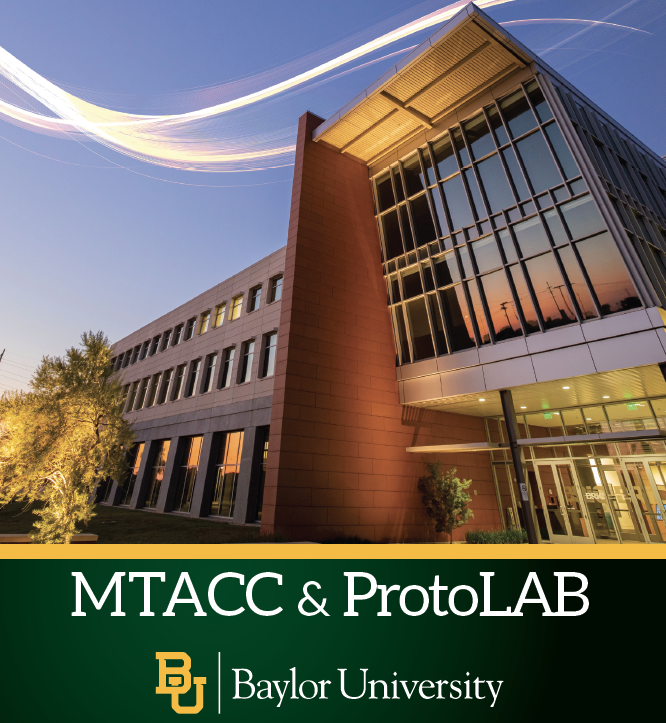Academic Rigor, Industry Speed

Baylor University’s industry-facing service centers were formed to provide cutting-edge research capabilities that foster collaboration and address industry challenges—and to do so in a way that eliminates many of the common challenges faced in academic-industry partnerships. Partners find that these core facilities, located within the Baylor Research and Innovation Collaborative, provide managed services within state-of the-art facilities, led by experienced problem-solvers.
Baylor’s Materials Testing and Characterization Core (MTACC) and ProtoLAB are two service centers that provide full-service, multi-discipline engineering services, design and project management, along with ISO-accredited materials imaging, testing, manufacturing and more.
Raymond Curtice, engineering manager of ProtoLAB and Blake Heller, Ph.D., MTACC director, bring deep industry experience to their roles. Curtice spent nearly two decades in aviation and aerospace engineering, including over a decade at L3Harris Technologies; Heller is a Baylor alum who served in materials engineering at Schlumberger before returning to his alma mater.
In this Q&A, they share how MTACC and ProtoLAB offer a new approach to industry-university research partnerships that offers academic rigor at industry speed.
What is MTACC, and what services does it provide? Heller:
What is ProtoLAB, and what services does it provide? Curtice:
ProtoLAB’s four pillars are mechanical engineering, electrical engineering, software development and human-centric design, and we have the expertise to address financial oversight, invention, consulting and other services. In short, ProtoLAB is here for industry to come to us with their hard problems, and we’re equipped to address them together.
How do MTACC and ProtoLAB represent a new model for university-industry research partnerships? Curtice:
Another challenge we address for industry comes through our edge as a research university. Research and development can be very expensive. But at Baylor, we can do it more inexpensively than industry can. So, if we combine speed to the cost-effectiveness of the academic world, and enable industry to access the depth of information that our outstanding faculty can provide, that’s a unique value we bring to the forefront.
What resources does MTACC offer that meet industry needs? Heller:
MTACC and ProtoLAB are a part of a growing research university. In what other ways can that benefit industry partners? Curtice:
There’s also another benefit to industry: we want you to poach our students. The cool thing about this is that we get to do all this under an umbrella that benefits Baylor students. For industry, there are many positives to that. When you hire a consulting firm, you are traditionally disincentivized from hiring any of them full-time. We are the opposite. Our students are going to graduate. We want them to leave the nest, and when you partner with Baylor, you’re going to work with students who could make great employees who will already be familiar with your organization and needs.
CONTACT MTACC:
ProtoLAB: Raymond_Curtice@baylor.edu (254)710-3607